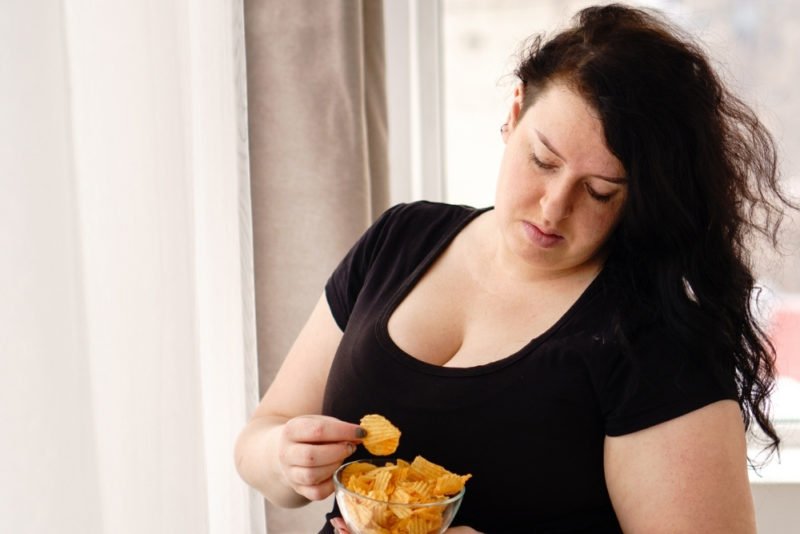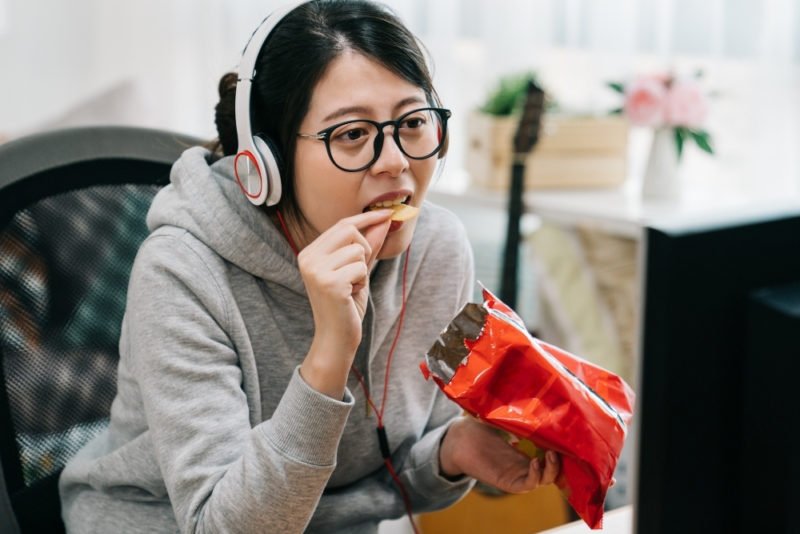
“I can’t stop overeating.” Odds are good that you’ve uttered these words before…or know someone who has. But what is “overeating” exactly? When we feel like we’ve overeaten, what do we really mean?
The perceived experience of overeating can be physical in nature – simply feeling too full – or emotional/psychological. Or both. Mindlessness may play a supporting role, and there can be a sense of being out of control, even if an objective outside observer would not view it the same way.
I want to take a look at themes that I’ve seen among my clients (I’ve also seen a few of these in myself way back when I was still entrenched in diet culture). Then, I’ll look at what a recent research study uncovered.

Feeling physically uncomfortably full
When you eat past the point of “comfortable” or “gentle” fullness you end up at uncomfortable fullness. This may be intentional or unintentional.
First, the unintentional. Maybe you were ravenously, primally hungry when you started eating. The urge to fill the big empty hole in your stomach – to end the discomfort of being TOO hungry – made it difficult to notice when you were approaching the point of having enough. So, what happens? You cruise right past “enough” and land at “too much.”
Maybe primal hunger isn’t the issue. Maybe the food is so delicious that you don’t want to stop eating, and then when we do stop, we think, “This doesn’t feel good…why did I DO that?” This is a form of emotional eating (yes, really), and Elyse Resch, co-author of “Intuitive Eating” wrote an article on this very issue, “The Sadness of Saying Enough.” This lies somewhere in between intentional and unintentional.
Now for the intentional (at least partly). Maybe you need to feel “too full.” Maybe that sensation, even though it’s unpleasant, offers distraction from other unpleasant, even painful things in your lives. Maybe you’re punishing yourself for something by making yourself uncomfortably full – this is a darker manifestation of emotional eating. Or maybe you have a history of food insecurity or other types of food scarcity, and you feel that the only way to convince yourself that you really, truly have enough food is to stuff yourself.
What feels “uncomfortably full” can vary from person to person, of course. It could be that one bite “too many” is the tipping point. Or, it may be eating to the point where you feel sick.

Not trusting your hunger
When you don’t trust your body’s hunger cues, this can cause you to delay eating until you are primally hungry, leading to uncomfortable fullness, as mentioned above.
However, if you don’t trust your hunger, even if you heed its earlier cues and eat when you are still comfortably hungry, you may think you are overeating even if you are eating “normally.”
Perhaps you are dieting (or in the early stages of diet recovery), and you feel a disconnect between how often your body is telling you it needs to eat and the external rules about “appropriate” food amounts or eating frequency that you are trying to follow. Maybe those rules have remained embedded in your brain even after you’ve started to break free from diet culture. It’s a tug-of-war between external rules and internal cues.
If you’re actively dieting, feelings of guilt or judgement when you break those external rules can feed the belief that you are overeating, when in fact you are simply not undereating. Ironically, dieters who believe they’ve “broken” their diets are more likely to actually overeat. (“I’ve already messed up so I might as well really go for it.”)
If you’ve decided you’re not dieting anymore, but haven’t fully disentangled yourself from diet mindset, you’re existing in the space between diet and non-diet worlds. This can feel uncertain and a little loosey-goosey. On days when you are feeling less secure in your decision to break up with dieting, those doubts can translate into feeling out of control in your eating. Like maybe you’re going TOO far and eating TOO much instead of simply not restricting your food anymore.

Binge eating and binge eating disorder
Sometimes ending restriction — whether intentionally or because you simply crack — does lead to compensatory overeating, in what might feel like, or actually be, a binge.
The short definition of binge eating is eating large amounts of food in a short period of time in a way that feels out of control. The longer clinical definition of binge eating is recurrent episodes of binge eating that include:
- Eating in a discrete period of time (say, within any two-hour period), an amount of food that is definitely larger than what most individuals would eat in a similar period of time under similar circumstances.
- A sense of lack of control over eating during the episodes. In other words, the feeling that you can’t stop eating or control what or how much you are eating.
If someone ALSO meets the criteria below, then the binge eating is considered to be binge eating disorder, a serious mental health condition.
- Binge eating episodes are associated with three or more of the following:
- Eating much more rapidly than normal.
- Eating until feeling uncomfortably full.
- Eating large amounts of food when not feeling physically hungry.
- Eating alone because of feeling embarrassed by how much one is eating.
- Feeling disgusted with oneself, depressed, or very guilty after overeating.
- Marked distress regarding binge eating is present.
- The binge eating occurs, on average, at least once a week for 3 months.
- The binge eating is not associated with the recurrent use of inappropriate compensatory behavior and does not occur exclusively during the course of bulimia nervosa or anorexia nervosa.
Binge eating also happens in secret, which can add to feelings of shame.

Compulsive overeating
“Compulsive overeating” is a kind of catch-all term that can have significant overlap with binge eating, on one hand, but look more like mindless eating, on the other. It may also merge with what feels like food addiction or emotional eating.
Can’t keep your hand out of the office candy dish? Find yourself grazing whenever you pass through the kitchen, then feel vaguely unsatisfied and wanting to eat more even though you aren’t hungry? This type of eating often has a strong mindless component, but it can also feel impulsive, or even compulsive.
If you feel like you eat compulsively because you are addicted to food, your feelings are real (I can’t state that sincerely enough), but please know that food addiction is a very controversial topic. Much of the research on food addiction didn’t factor in whether participants — often college-age females — were dieting. And we know that restriction can lead to compensatory overconsumption – rebound eating – when we are finally given permission (by ourselves or someone else) to eat highly palatable foods such as milkshakes.
So it’s worth teasing out what’s really going on when you feel out-of-control around cookies, cake, ice cream or whatever. Could it be binge eating disorder? A response to restriction? Emotional eating?

Eating the “wrong” foods
Eating foods that don’t fully nourish you can be related to dieting – or rebelling against dieting – or it could be that you aren’t investing the time or planning needed to prepare nutritious meals and snacks that are both tasty and leave you feeling good physically.
Eating on the fly, picking up takeout or fast food, grazing on snack foods or just grabbing what’s available from the office vending machine, can then feel like overeating, especially if you feel guilty about it.
What this really is a lack of body-food choice congruence. Body-food choice congruence is an element of gentle nutrition, which is the basis of the tenth principle of Intuitive Eating. This concept is all about making food choices based on health and body functioning, as well as pleasure.
Body-food choice congruence has to do with how food feels in your body, not how food might make your body look. It goes beyond what your taste buds might crave and, to quote Evelyn Tribole, “It means that the tongue is not the only part of the body that we honor when making food choices.”
To assess your body-food choice congruence, ask yourself if these statements are true for you:
- Most of the time, I desire to eat nutritious foods.
- I mostly eat foods that make my body perform well.
- I mostly eat foods that give my body energy and stamina.
If any of these statements are not true for you, that simply means that you have some work to do. It does not mean that you’re “bad” for making “bad” food choices, or that you’ve failed in any way.

What does the research say?
A study published in 2020 pointed out that overeating is associated with poor self-esteem, body dissatisfaction, use of unhealthy weight-control techniques and symptoms of depression. But here’s the kicker: these adverse effects don’t happen only after people eat an objectively large amount of food –they happen when people simply think they’ve overeaten.
To get a sense of what people mean when they believe that they’ve overeaten, the study’s researchers asked 471 women and men to rate the extent to which a list of statements “captured the meaning of overeating.” Overall, participants identified these themes, in order:
- Eating outside hunger. This includes continuing to eat when no longer hungry, not being able to resist tasty food even when full, eating past the point of fullness, eating until feeling uncomfortable and sick, and simply eating when you know you aren’t hungry.
- Mindless eating. This includes eating mindlessly as well as eating for emotional reasons, eating just for something to do and eating without knowing why you are eating.
- Eating more than “normal.” This includes eating more food than other people at the same meal, eating much more than the average person would eat under similar circumstances, eating more than you would usually eat in similar situations, eating an amount that others would consider excessive, eating much more than the suggested serving size, and eating more than is appropriate for the situation.
- Lack of restriction. This includes eating more than you intended to, eating more than you need nutritionally, cleaning your plate, eating more than you need, going back for seconds, eating outside of planned meals and snacks, eating enough to gain weight, eating more than you wanted to, and eating more than you “should” based on recent physical activity levels.
Perhaps not surprisingly, participants who had a body mass index (BMI) above the “normal” range, who perceived themselves to be fat, were restrained eaters (i.e., dieting) or who had indicators of eating disorder behaviors (specifically anorexia or bulimia) were more likely to rate these themes as being more relevant to the concept of overeating.
More food for thought
As you can see, “overeating” is a single word that can refer to many things, some of them quite complex. If you struggle with overeating, rather than label yourself or beat yourself up, dig deeper. The solution isn’t to buckle down, or to get yourself “under control.” (Especially since it’s entirely possible that too much control is a trigger.)
The real solution may actually be relaxing some food rules. Or, it may mean dealing with underlying emotional or psychological issues. If there’s a true problem, you deserve to find a true solution.
Disclaimer: All information provided here is of a general nature and is furnished only for educational purposes. This information is not to be taken as medical or other health advice pertaining to an individual’s specific health or medical condition. You agree that the use of this information is at your own risk.
Hi, I’m Carrie Dennett, MPH, RDN, a weight-inclusive registered dietitian, nutrition therapist and body image counselor. I offer compassionate, individualized care for adults of all ages, shapes, sizes and genders who want to break free from eating disorders, disordered eating or chronic dieting. If you need to learn how to manage IBS symptoms with food, or improve your nutrition and lifestyle habits to help manage a current health concern or simply support your overall health and well-being, I help people with that, too.
Need 1-on-1 help for your nutrition, eating, or body image concerns? Schedule a free 20-minute Discovery Call to talk about how I can help you and explore if we’re a good fit! I’m in-network with Regence BCBS, FirstChoice Health and Providence Health Plan, and can bill Blue Cross and/or Blue Shield insurances in many states. If I don’t take your insurance, I can help you seek reimbursement on your own. To learn more, explore my insurance and services areas page.
 Print This Post
Print This Post






